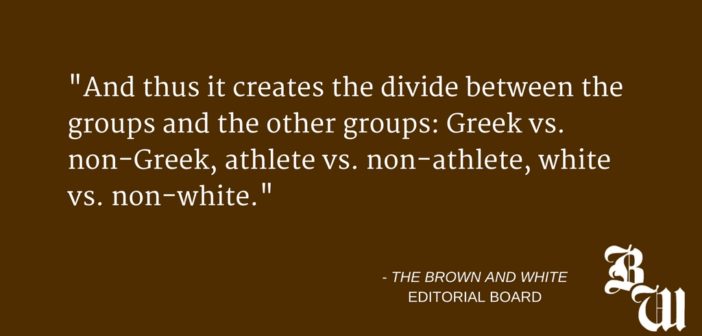Blonde hair. Blue eyes. 5 feet 11 inches. 150 pounds.
A human brain starts to form perceptions as we hear more and more information about someone. Think of it like a puzzle. The more pieces you connect, the clearer the image becomes.
But information is not distributed in independent, equally-sized pieces. It would be unproductive to process things at such a slow speed, neglecting prior associations that are already burned into our memory.
Lehigh business student.
In far fewer words, a descriptor such as what college a student is enrolled in can evoke a significantly greater amount of information. For example, when you think of a business student, you might think of someone who is focused on their career, someone who is a good communicator, etc.
Or you can think about it in terms of what they are not.
Because the aforementioned student is not in the engineering college, you might assume they are not as talented of a mathematician. Because they are not in the college of arts and sciences, you might assume they are less creative.
These assumptions could be entirely correct, or they could be completely bogus. But the important thing to realize is they are based off stereotypes. And while categorization is a natural phenomenon, it can get dangerous when we try to separate groups by otherizing them.
Otherizing happens when you assume qualities about people based off groups they are not a part of. In the case of the business student, it was the notion that they may be less gifted in other areas such as math or creativity.
It happens at Lehigh all the time because there are so many distinct categorizations to make. It begins with the prominence of Greek life in a school that houses 5,000 undergraduate students. Add the fact that about one in six students is a varsity athlete, and it becomes even narrower. Finally, with Lehigh’s 65 percent white student body, race can become a factor as well.
And thus it creates a divide between the groups and the “other” groups: Greek vs. non-Greek, athlete vs. non-athlete, white vs. non-white.
But Greek life becomes the greatest specifier, and it’s taken a step further.
The stereotype of an individual based on what Greek chapter they belong to occurs like no other stereotype on campus. When introducing a friend or recounting a story about them, the first piece of information given out is almost always the house the person is in.
In an arrogantly short moment of time, it seems as though enough background information has been introduced by this one detail. It is the assured feeling of understanding someone, at least in a basic sense, based on a generalization that contributes to the problem.
So how would you describe someone when they are not in Greek life?
You could mention where they are from, what their major is, if they participate in any clubs, or any other distinctive qualities about them. Instead of being labeled by a Greek chapter’s stereotype, they are free to be judged based on their true persona.
It sounds like a luxury, but it’s missing out on a key detail of stereotyping and what it means to otherize someone — the description stops at “not in Greek life.”
Faced with an opportunity to personify, we choose to otherize.
Of course, we cannot blame everyone who decides to stereotype. If that were the case, we would all be to blame. But just as everyone is part of the problem, we can all be part of the solution. The best way to help fix the issues of stereotyping and otherizing is to exercise our perspective and think about how we are thought of, and what we have in common.
No matter what stereotypes we carry, when we leave campus we carry the title of Lehigh student.
No matter what stereotypes we carry, when we leave the United States we carry the title of American.
No matter what stereotypes we carry, no matter where we go, we are all human.
There is no other.






Comment policy
Comments posted to The Brown and White website are reviewed by a moderator before being approved. Incendiary speech or harassing language, including comments targeted at individuals, may be deemed unacceptable and not published. Spam and other soliciting will also be declined.
The Brown and White also reserves the right to not publish entirely anonymous comments.
2 Comments
Another terrible article by the FAILING Brown and White. More FAKE NEWS. Sad!
Wonderfully written, and perfectly stated.